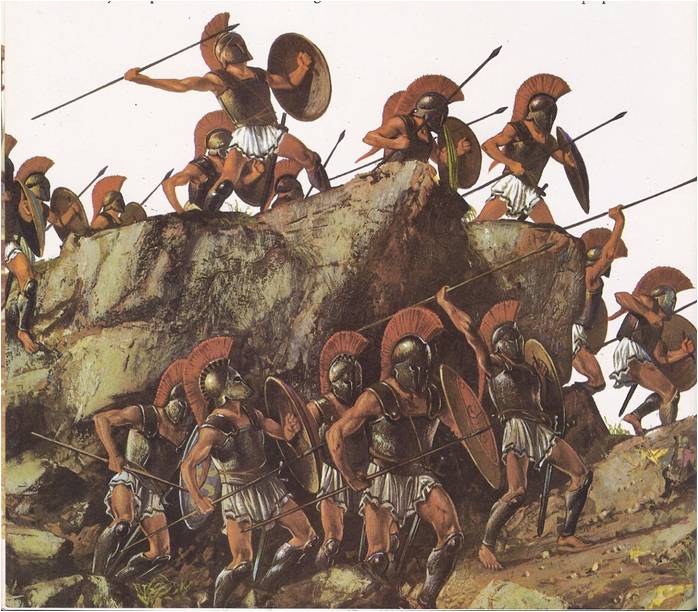In the time when savage warriors roamed the plains and mountains of Italy, there stood on six low hills, just south of the river Tiber, six clusters of round huts made of twigs and leaves stuck together with mud. Each was a little town, the home of barbarian tribesmen. They herded cattle on the plain below, chased the wild pigs in the woods and tried to make things grow in their marshy fields. Although the towns were always fighting or stealing cattle and sheep from each other, they shared a market place in a clearing beside the river. They also …
Read More »Tag Archives: Peloponnesus
The Greek Way of Life 700 B. C. – 343 B. C.
In the first years of Spartan peace, Greece was filled with wandering soldiers. Their little cities needed them no more. The new governments, which Spartans appointed, looked on them as men who might make trouble and were quick to get rid of them. Homeless and with no way to earn a living, the old campaigners roamed from place to place. They became soldiers of fortune, men who fought for any general or city that offered pay and three meals a day. In 401 B. C., ten thousand of them hired themselves out to Cyrus, a prince of Persia, who hoped …
Read More »Greek Against Greek 430 B. C. – 404 B. C.
About 425 B. C., a lonely man, in a country that was not his own, sat down to write the story of a war that had begun six years before. Thucydides, an Athenian, had fought in the war’s first battles. He had been a general, in command of thousands of his city’s troops. Then he was ordered to go to the aid of another commander whose men were outnumbered. When he arrived, the battle had already been fought and lost. It was not his fault but the people of Athens were too anxious about the war to consider that. They …
Read More »Greece Fights for its Life 499 B. C.-479 B. C.
Across the Aegean, from the oriental court of King Darius of Persia, came messengers to all the city-states of mainland Greece. Their words were smooth, their smiles like sneers and they demanded gifts for their master – earth and water, the ancient tokens of tribute and surrender. The Greeks in Asia Minor already knew the Persians – too well; once the smiling messengers had come to the cities. After the messengers, the soldiers came, attacking the little poleis, one by one, until all of them were taken. Nothing could stop the Persian armies. From the capital, deep in Asia, they …
Read More »Sparta: City of Soldiers B. C. 700 – 500
In Sparta, the shops in the market place had little gold or jewelry to sell and no fine furniture at all. The people in the streets were not well dressed. Even the temples, although big, were plain and there was little in Sparta to show that this was the strongest polis in Greece. Sparta was old fashioned and proud of it. The polis had begun as a kingdom and it stayed a kingdom. The only change its citizens made in more than 400 years was to have two kings instead of one. Each kept a watchful eye on the other …
Read More »Companions of the King 1500 B.C. – 1000 B.C.
Across the plains of Peloponnesus, flashed the swift chariots of knights and warrior-princes. They wore armour of gleaming bronze and bright proud plumes bobbed above their helmets. They were the new men of a new country and they called themselves the Achaeans. Their kings called themselves the Sons of Pelops, the mighty chief and hero who had given his name to the Peloponnesus. Pelops, the Achaeans said, was the son of a god. Probably, however, he was the grandson of an European invader, for many of the Achaeans’ ancestors were barbarian invaders from the north. But they may have seemed …
Read More »The Power of Minos 2200 B.C. to 1400 B.C.
Far to the south of the Greek Peninsula lay the large island of Crete. It was the home of a nation of sea-warriors – cruel, dark, handsome men, who claimed the eastern Mediterranean and all the Aegean Sea as their own. For eight hundred years — from 2200 to 1400 B. C. — they made good on their claim. The Cretan seamen strutted about the decks in loincloths and high bools. They wore clanking jewelry of finely worked gold, curled their long hair and rubbed their bodies with perfumed oil so that they glistened in the sunlight. They were fighters …
Read More »The Silent Peninsula 3000 B.C. to 1600 B.C.
About 3000 B. C., when the Pharaohs ruled Egypt and Babylon was the home of mighty kings, bands of sailors set out from Asia Minor. They followed a little chain of islands that led northward across the unexplored sea that, centuries later, would be called the Mediterranean. If the islands had not been there, the sailors would never have dared to sail so far from home. Asia, the only world they knew, stopped at the eastern store of the sea. Some of the men were afraid that they might suddenly reach the end of the world and drop over it …
Read More »






